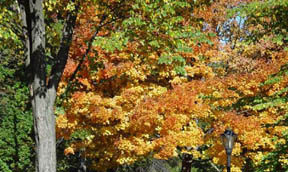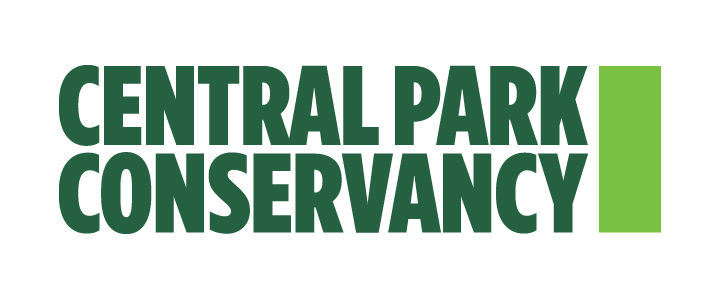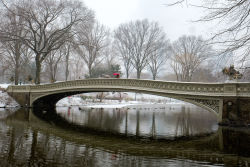Central Park
The Daily Plant : Thursday, September 5, 2002
ASK PROFESSOR GINGKO

Photo By Susan Thompson
Professor Ginkgo:
When and why do leaves change color in the fall?
The spring and summer are very important times for a tree. In photosynthesis, the tree's leaves use the sun's energy to convert water and carbon dioxide into carbohydrates (sugars and such) and oxygen. Now, there are lots of different colored pigments inside each leaf, but during the spring and summer, the tree produces and breaks down a steady stream of chlorophyll (a chemical that is essential to its food production).
In the fall, clothes start getting heavier, hair lengths start getting longer, the temperature starts to drop, and the days start getting shorter. As this happens (now I'm talking primarily about the sunlight), trees stop their food-making. At this point, the chlorophyll breaks down faster than it is produced until there's virtually none left. Meanwhile, the other pigments in the tree start to shine. Carotenoids (think corn, carrots and buttercups and bananas) begin to surface and are responsible for the yellow, orange and browns you see. Furthermore, other pigments begin to develop such as anthocyanin (the proud sponsor of concord grapes, blueberries, cherries, strawberries, and more ) give the leaves newfound colors including brilliant oranges, deep reds, and delectable purples.
I'm sorry to report that it's difficult to predict exactly when (and which) colors will appear, but generally the foliage starts changing late September in northern New England and works its way south as the days pass. Some of the most popular spots in NYC to view the foliage change color are Literary Walk in Central Park and by the Pond in Prospect Park.
Dear Professor Ginkgo,
Is it better to water my lawn in the morning or evening?-my neighbor is telling me that it's better to do so in the morning.
I commend your efforts to conserve water during New York City's Stage I drought emergency. However, I believe your neighbor might have the right idea. As of September 2, our reservoir levels are at 68.1% (the normal for this time of year is 80.7%), and the DEP has mandated that all lawn-watering occur before 9:00 a.m. or after 7:00 p.m.
Although you're technically allowed to water at sunset, DEP advises that it is much more helpful to water in the morning. This is because plants generally require sunlight to absorb water. During photosynthesis, plants draw the water into their roots as they produce food. If you only water as the sun is going down, however, the water ends up sitting in the soil all night. Eventually, this leads to rotting, unhealthy lawns, and unfriendly neighbors.
Written by Professor Ginkgo
THIRTEEN YEARS AGO IN THE PLANT
(Thursday, September 14, 1989)
25-FOOT DRAGON EXPECTED IN NORTHERN MANHATTAN
While knights in shining armor search for fire-breathing dragons, troubadors and minstrels will serenade fair maidens, and jesters and magicians will charm the crowds at Fort Tryon Park's Medieval Festival on Sunday, September 24. Presented by the Washington Heights & Inwood Development Corporation and Parks, this free festival will take place from noon to 5 p.m.
The festival, stretching across the 67-acre park from Margaret Corbin Circle north to The Cloisters Museum, will include a human chess match, a medieval fashion show, colorful pageantry, demonstrations of medieval crafts and combat, authentic food and wares for sale and-not to be missed-a Royal joust, scheduled for 4 p.m. In the joust two knights on horseback will face off to win the favor of the Royal Court.
QUOTATION FOR THE DAY
"Great art picks up where nature ends."
Marc Chagall
(1887-1985)
Check out your park's Vital Signs
Clean & Safe
Green & Resilient
Empowered & Engaged Users
Share your feedback or learn more about how this park is part of a
Vital Park System

Know Before You Go
Anticipated Completion: Spring 2024
Anticipated Completion: Spring 2025

Contacts
Central Park Information: (212) 310-6600
Central Park Information (for the Hearing Impaired): (800) 281-5722
Belvedere Castle, The Henry Luce Nature Observatory: (212) 772-0210
The Charles A. Dana Discovery Center: (212) 860-1370
The Dairy Visitor Center and Gift Shop: (212) 794-6564
North Meadow Recreation Center: (212) 348-4867
Loeb Boathouse (Bike rentals, boat rentals & gondolas): (212) 517-2233
Carousel: (212) 879-0244
Fishing at Harlem Meer (Catch & Release): (212) 860-1370
Harlem Meer Performance Festival: (212) 860-1370
Horseback Riding - Claremont Stables: (212) 724-5100
Metropolitan Opera (Performances on the Great Lawn): (212) 362-6000
New York Philharmonic (Performances on the Great Lawn): (212) 875-5709
Shakespeare in the Park - The Public Theater at the Delacorte Theater: (212) 539-8655
Central Park SummerStage: (212) 360-2777
Swedish Cottage Marionette Theater: (212) 988-9093
Tennis: (212) 280-0205
Weddings, Ceremonies and Photography at the Conservatory Garden: (212) 360-2766
Wildlife Center & Tisch Children's Zoo: (212) 439-6500











